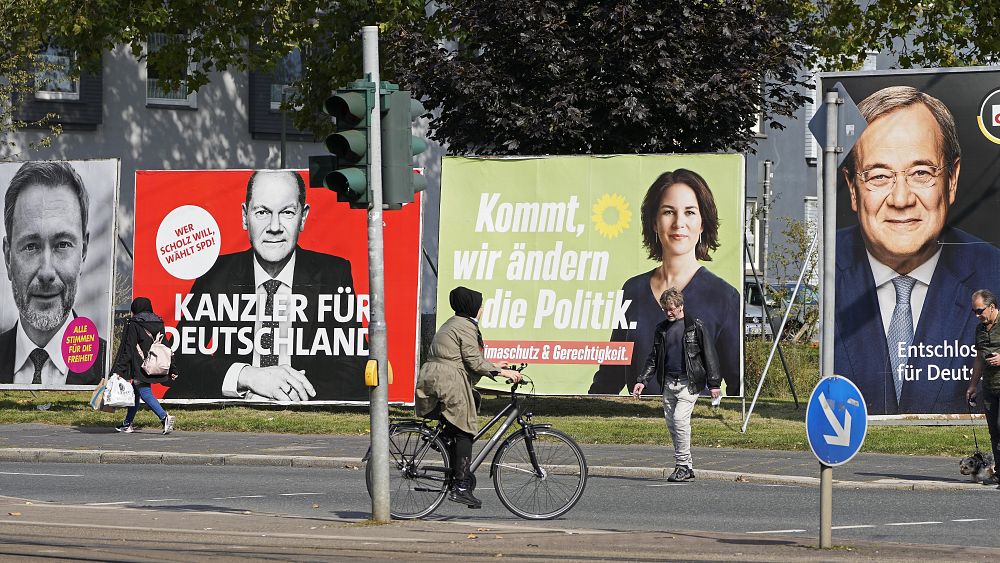
German voters will head to the polls on Sunday for a federal parliamentary election that will spell the end of Chancellor Angela Merkel’s 16-year at the helm of the country.
In the run-up to the important ballot, Euronews caught up with some voters to take a pulse of what the key issues are for them and what they expect from the next government.
Healthcare
Sarah Branse, 36, an intensive care nurse, was on the frontline when the pandemic struck.
“I would like our newly elected politicians to reform our healthcare system, recognise health workers and improve working conditions,” she said.
She is also the founder of a relief organisation for victims of the devastating floods that struck western Germany last July. The nurse, who lives in Neuenahr-Ahrweiler, Rhineland-Palatinate, said the area “needs money fast”.
“We have had deaths, we have had injuries. People have lost all their belongings in the floods,” she said, adding that there’s much more to be done in terms of environmental policy. Because, she argued, “if we adapt the course of the rivers to our lives, then at some point they will take their revenge.
Climate crisis
Franziska Grotz is a 22-year-old student aiming to become a primary school teacher/
She thinks the most pressing issue facing the country right now is the climate crisis.
“In recent weeks, we have seen flood disasters, fire disasters and heatwaves. Here in Germany, for example, we have had cold and rain throughout the summer. Climate change is no longer a possibility, but a reality,” she told Euronews.
“So it’s imperative that we do something to at least contain warming to the point where we can continue to live in the world,” she added.
Fellow student Constantin Estroff, concurred. The 22-year-old regularly attends the Fridays for Future climate protests and thinks politicians do not listen enough to what people want and should be bolder on climate.
“In the future, I want to help ensure that new technologies and the companies associated with them serve people, society and the environment, instead of destroying them,” Estroff also said.
Bureaucracy
Joachim Stoll is an entrepreneur and vice-president of the Hessian Chamber of Commerce. He believes red tape and bureaucracy are hindering innovation in Europe’s largest economy.
The 59-year-old closed his leather goods business, which his great-grandfather had started 101 years ago, earlier this month.
He hopes these elections will usher in a fresh start for the country.
“We need a new beginning aimed at cutting bureaucracy, not such terribly long planning times,” he said. “We need faster planning, especially for public transport. When you hear specialists saying it will take 15 years to extend the S-Bahn in Frankfurt, you think: ‘What a disaster'”.
Europe
Political scientist and author Asiem El Difraoui, 56, believes Europe should be discussed more at the national level and that member states should respond to the recent events in Afghanistan by converging towards a common European foreign and security policy.
“For me, as a firm pro-European, and especially after what happened in Afghanistan, the most important issue is Europe,” he told Euronews.
“How do we manage to create a more united and stronger Europe? This requires a common foreign policy, but also a common security policy and a Europe based on solidarity that can also jointly master the COVID-19 crisis”, he added.
Diversity
Tijen Onaran is a 36-year-old digital entrepreneur and author. She splits her life between Munich and Berlin. She thinks there are not enough women holding positions of powers, and diversity is lacking in both the business and political world.
She advises companies on diversity and inclusion issues and her mission is to help increase diversity in businesses, “not only in terms of gender, but also in terms of origin, generation and other things,” she said.
Social issues and equality
Benedikt Hielscher, 34, who lives in Berlin, is the CEO of a start-up called “Smoke Free 23”.
He also cited the environment and Germany’s place in Europe and in the world as key issues he wants the next government to focus on, in order for the country to push forward on building “a fairer and more equal Europe.”
“I see social divide as a very pressing issue for us at the moment. Coronavirus has made it even more evident”, he added.